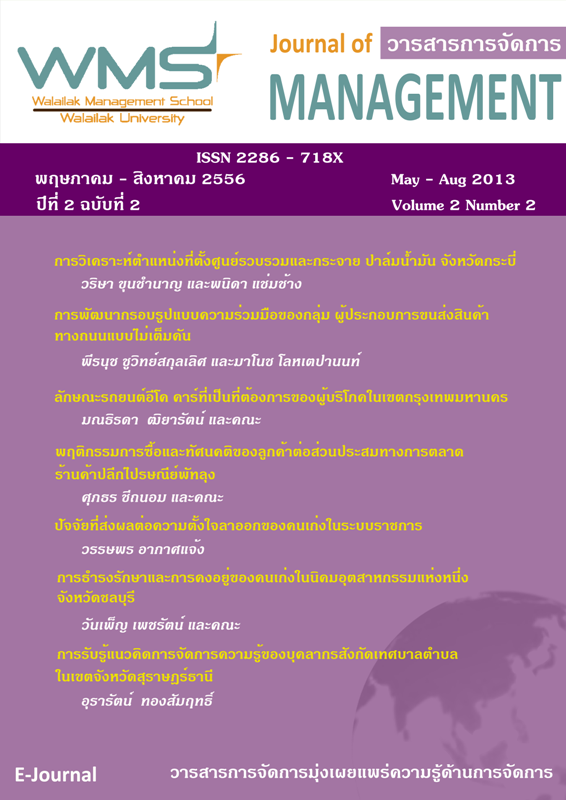Factors that affect the intention of Talents to leave the Bureaucracy
Main Article Content
Abstract
This research aims at identifying factors affecting intention of talents to leave the government agencies. One hundred and twelve respondents were selected from ordinary civil servants who participated in the High Performance and Potential System or HiPPS program. The questionnaire survey was the method selected to collect primary data which was later processed and analyzed by SPSS for Windows in order to obtain important statistical data.
The research findings showed that factors which were negatively correlated to the intention of talents to leave the government agencies with the statistically significant level of 0.05 included professional status and interpersonal relationship. On the other hand, work itself and achievement, bureaucracy, compensation, factors in personal life and working condition were not correlated to the intention of talents to leave the government agencies.
Article Details
References
ชัยวัฒน์ ไพนุพงศ์. 2551. ปัจจัยที่ส่งผลต่อความพึงพอใจในการปฏิบัติงานของพนักงานกลุ่ม Gen Y. การศึกษาอิสระ, มหาวิทยาลัยธรรมศาสตร์, คณะพาณิชยศาสตร์และการบัญชี, สาขาวิชาบริหารธุรกิจ.
ฐิติพร ชมพูคำ. การจัดการคนเก่ง: เครื่องมือสำคัญสำหรับคนสำคัญขององค์กร (Talent Management: A significant Tool for Significant Persons). วารสารจุฬาลงกรณ์ธุรกิจปริทัศน์, ปีที่ 26 ฉบับที่ 101 (ก.ค. – ก.ย. 2547), 1-16.
ธวัชชัย บุญเพิ่มราศี. 2552. ความสัมพันธ์ระหว่างบุคคลที่มีผลต่อการตั้งใจลาออกจากงานของบุคลากร: ศึกษาเฉพาะกรณีบุคลากร สาย ค ของมหาวิทยาลัยธุรกิจบัณฑิตย์. สารนิพนธ์ปริญญามหาบัณฑิต, มหาวิทยาลัยเทคโนโลยีพระจอมเกล้าพระนครเหนือ, คณะศิลปศาสตร์, สาขาวิชาจิตวิทยาอุตสาหกรรมและองค์การ.
ปฐมพงษ์ โตพานิชสุรีย์. 2553. ปัจจัยที่ส่งผลกระทบต่อการรักษาคนเก่งในองค์การ: กรณีศึกษาข้าราชการพลเรือนสามัญ. วิทยานิพนธ์ปริญญามหาบัณฑิต, มหาวิทยาลัยธรรมศาสตร์, คณะพาณิชยศาสตร์และการบัญชี, สาขาวิชาบริหารธุรกิจ.
ปรีดียาธร เทวกุล, ม.ร.ว. 19 กรกฎาคม 2549. เยียวยาสมองไหล จุดประกายความก้าวหน้า... ดึงคนเก่ง เงินไม่ใช่ยาวิเศษแก้ทุกโรค. มติชน, 18.
พงศธร ทิมเจริญ. 2549. ปัจจัยของความสำเร็จของการดำเนินโครงการบริหารจัดการคนเก่งในองค์การ. สารนิพนธ์มหาบัณฑิต. สถาบันบัณฑิตพัฒนบริหารศาสตร์. โครงการบัณฑิตศึกษาการพัฒนาทรัพยากรมนุษย์
วาสิตา ฤทธิ์บำรุง. 2548. การบริหารจัดการคนเก่งเพื่อสร้างความได้เปรียบทางการแข่งขันขององค์กร. สารนิพนธ์ปริญญามหาบัณฑิต, สถาบันบัณฑิตพัฒนบริหารศาสตร์, คณะวิทยาศาสตร์, สาขาการพัฒนาทรัพยากรมนุษย์และองค์การ.
สมบูรณ์ กุลวิเศษชนะ. Retaining Talent People: (ไม่) ยากอย่างที่คิด. วารสารบริหารธุรกิจ, ปีที่ 29, ฉบับที่ 109 (ม.ค. – มี.ค. 2549) 10-12.
สินีนาฏ ชาวตระการ. 2552. ความตั้งใจที่จะลาออกจากงานของเจ้าหน้าที่ ศึกษาเฉพาะกรณี ศูนย์ประสานความร่วมมือระหว่างไทย ออสเตรเลีย เนเธอร์แลนด์ เพื่อการศึกษาวิจัยทางคลินิกด้านโรคเอดส์ ศูนย์วิจัยโรคเอดส์ สภากาชาดไทย. วิทยานิพนธ์ปริญญามหาบัณฑิต. มหาวิทยาลัยมหิดล, คณะบัณฑิตวิทยาลัย, สาขาวิชาเอกบริหารสาธารณสุข.
สุธิภรณ์ ตรึกตรอง ดวงกมล โรจนศักดา และสาริณี มั่นเจริญศิริ.2550. คนเก่ง: Talent Identification กรณีศึกษา บริษัท Avalant จำกัด. การศึกษาอิสระ, มหาวิทยาลัยธรรมศาสตร์, คณะพาณิชยศาสตร์และการบัญชี.
สุภาพร ทรงสุจริตกุล สุภัทรา ชัยกิจ และปณัฐพันธ์ สันติรัตตกุล. 2551. Talent Retention กรณีศึกษากลุ่มผู้บริหาร บริษัท ทรู วิชั่นส์ จำกัด (มหาชน). การศึกษาอิสระ, มหาวิทยาลัยธรรมศาสตร์, คณะพาณิชยศาสตร์และการบัญชี.
สุภาพร แสงดาว. 2549. ความสัมพันธ์ระหว่างจุดหมายในอาชีพ คุณลักษณะของงาน บรรยากาศองค์การและความตั้งใจลาออกของข้าราชการที่เป็นผู้ได้รับทุนรัฐบาล. วิทยานิพนธ์ปริญญามหาบัณฑิต, มหาวิทยาลัยธรรมศาสตร์, คณะศิลปศาสตร์, สาขาวิชาจิตวิทยาอุตสาหกรรมและองค์การ.
สุวิมล ว่องวาณิช และนงลักษณ์ วิรัชชัย. 2546. แนวทางการให้คำปรึกษาวิทยานิพนธ์. กรุงเทพมหานคร: ศูนย์ตำราและเอกสารทางวิชาการ คณะครุศาสตร์ จุฬาลงกรณ์มหาวิทยาลัย.
เสาวคนธ์ วิทวัสโอฬาร. จับให้มั่นคั้นให้เวิร์ค. กรุงเทพฯ: บริษัท เนชั่นมัลติมีเดีย กรุ๊ป จำกัด (มหาชน), 2550.
อาภรณ์ ภู่วิทยาพันธุ์. 2550. กลยุทธ์การบริหารและพัฒนาคนเก่ง. กรุงเทพฯ: เอช อาร์ เซ็นเตอร์.
Berger, A.L and Berger, R.D. 2004. The Talent Management Handbook: Creating Organizational Excellence by Indentifying, Developing, and Promoting Your Best People. New York: McGraw-Hill.
Bhatnagar, J. 2007. Talent management strategy of employee engagement in Indian ITES employees: key to retention. Employee Relation. Retrieved September 20, 2011 from http://www.emeraldinsight.com/Insight/viewContentItem.do;
Cappelli, P. 2550. การว่าจ้างและรักษาบุคลากร. (ประคัลภ์ ปัณฑพลังกูร, ผู้แปล). กรุงเทพฯ: เอ็กซ์เปอร์เน็ท. (ต้นฉบับพิมพ์ปี 2002).
Chambers, E., Handfield-Jones, H., Hankin, S., & Michaels III, E. 1998b. Win the War for Top Talent. Workforce, 77(12): 50-55.
Ferris, G.R., Rossen, S.D.,& Barthum, D.T. 1996. Handbook of Human Resource Management. 2nd ed. Oxford: Blackwell. jsessionid=4290E6041D623A34F97EB805580B795C?contentType=Article&contentId=1634387.
Michaels,E. Handfield-Jones,H. & Axelrod,B. 2001. The war for talent. Massachusetts: McKinsey & Company Inc.
Mowday, R.T., Porter, L.W., et al. 1982. Employee-organization linkages the psychology of Commitment, Absenteeism and Turnover. New York: Academic press.
Price, J.L. and Mueller, C.W.1986. Handbook of organizational measurement. USA: Pitman Publishing Inc.
Steers, R. M. 1977. Antecedent and outcomes of organization commitment. Administrative Science Quarterly 22(1): 46-56.
Stephanie Armour. 2005. Generation Y: They've arrived at work with a new attitude. Retrieved 20 June , 2011 from http://www.usatoday.com/money/workplace/2005-11-06-gen-y_x.htm.


